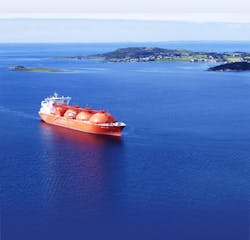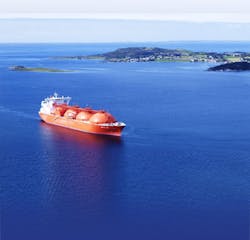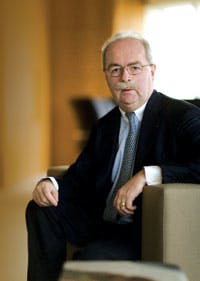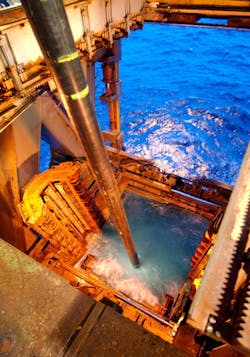Total increases its focus on upstream sector
Don Stowers, Editor — OGFJ
From its creation in 1924 as the Compagnie française des pétroles, France's Total, together with its subsidiaries and affiliates, has grown to become the world's fifth largest publicly–traded integrated oil and gas company in 2010 with 96,950 employees and operations in more than 130 countries. The company's market valuation is in excess of US$135 billion.
Total engages in all aspects of the petroleum industry, including upstream operations (oil and gas exploration, development, production, and LNG) and downstream operations (refining, marketing, and the trading and shipping of crude oil and petroleum products).
Total is also a major player in chemicals (base and specialty chemicals). In addition, Total has interests in the coal mining and power generation sector and is developing complementary next–generation energy activities (solar, biomass, nuclear).
Although the multinational energy giant has its hands in many parts of the energy universe, from hydrocarbons to renewables to nuclear, the company's chief financial officer, Patrick de la Chevardière, recently told Oil & Gas Financial Journal that the company has reiterated its strategy recently and will concentrate greater attention on the upstream energy sector.
"Our strategy is to increase our exposure in the upstream sector, which we feel has the greatest upside potential," said Chevardière. "We believe that world demand will be constrained by supply by the end of this decade, and we want to be in a position to take maximum advantage of this situation. Our goal is to devote about 75% to 80% of our capital to the upstream sector, which will mean some integration, some restructuring."
Total's core petroleum producing area is Africa, in particular, offshore Nigeria and Angola, and also Algeria, Gabon, and Cameroun. In Europe, Total is still an active producer in the North Sea. The company has operations in Indonesia, Thailand, Myanmar, the Middle East, and Canada.
More recently, Total has entered into alliances with Cobalt Energy International in the Gulf of Mexico and with Chesapeake Energy in the Barnett Shale in North Texas. In addition, the company is actively looking for partnerships in other areas — such as the former Soviet Union — in an effort to grow its oil and natural gas reserves over the next decade.
The October 2009 joint venture with Chesapeake is significant for Total, which is paying the Oklahoma City–based energy producer US$2.25 billion for acquiring a 25% share in Chesapeake's Barnett Shale portfolio. The assets have current net daily production of approximately 700 million cubic feet of natural gas and include about 300,000 net acres of leasehold, of which 90% are in the core area of the Barnett play.
Chesapeake is the second–largest producer of natural gas in the United States and is currently the most active driller of new wells in the US. In addition to the Barnett Shale play, the company has significant assets in the Haynesville Shale, the Fayetteville Shale, the Marcellus Shale, and the Eagle Ford Shale in South Texas.
"We have agreed to discuss with Total an Eagle Ford joint venture as well as joint ventures covering several Canadian natural gas shale plays in which Total has shown an interest," said Aubrey McClendon, Chesapeake's CEO.
Total's share of current production in the Barnett will be roughly 175 million cubic feet per day of natural gas (30,000 barrels of oil equivalent), with forecast growth increasing Total's share of production to more than 250 million cubic feet per day of natural gas in the near future. Total's share of proven reserves will be approximately 0.75 trillion cubic feet of gas (130 million barrels of oil equivalent), with additional unproved reserves of about 1.6 trillion cubic feet (270 million barrels of oil equivalent).
Christophe de Margerie, CEO of Total, commented on the Chesapeake transaction: "Total is pleased to be making a strategically important move by entering into the US non–conventional gas business with Chesapeake, the world's leading shale gas operator. This joint venture will provide us with a solid position in an attractive long–term resource base under competitive terms. It will allow Total to develop an expertise in unconventional hydrocarbons in order to expand its unconventional business worldwide."
Margerie, who joined Total in 1974 and has served as CEO since 2007, added, "This transaction provides yet another key support for Total to further build the gas value chain position that has been established in the US, the world's largest and most liquid natural gas market, with our existing capacity rights in the Sabine Pass LNG terminal and our gas trading and marketing organization. Total is conscious of the environmental aspect linked to producing shale gas and has confidence in Chesapeake's capacity to contain the impact of the Barnett Shale gas operations on the environment and respect local and federal regulations and guidelines."
Despite a weak environment, Total's 2009 financial results showed a strong resilience. We had a 13% return on average capital employed in a weak economy. The company, which has been progressively divesting non–core assets, had a net debt–to–equity ratio of 27% at year–end 2009. Total paid US$7.6 billion of dividends in 2009, a 5% increase over the prior year.
The company successfully started up five major projects in 2009 and plans to launch five major projects this year. Total's goal is to create value through discipline and operational excellence. As stated previously, it plans to place renewed emphasis on the upstream sector and gain access to new resources, notably through partnerships, such as the one with Chesapeake.
The five major projects in 2009 were:
- Akpo — The Akpo gas and condensate field offshore Nigeria started production in March 2009. Discovered in 2000, the Akpo field is operated by Total, with 24% interest. Started in 2005, the Akpo field development project includes 22 production wells, 20 water injections wells, and two gas injection wells tied–back to an FPSO.
- Tahiti — Total commenced production in the Tahiti field in the US Gulf of Mexico in May 2009. The deepwater field is operated by Chevron, and Total owns a 17% interest along with Statoil. The project reached a plateau production of about 125,000 barrels of crude oil per day and 70 million cubic feet of natural gas per day by year–end 2009. Total acquired its stake in the Tahiti field in 2005.
- Tombua–Landana — The Tombua and Landana fields, offshore Angola, started crude oil production in August 2009. The fields are operated by Chevron, and Total owns a 20% interest. Peak production of 100,000 barrels per day is expected in 2011, and recoverable resources for the two fields are estimated at 350 million barrels. The US$3.8 billion Tombua and Landana project includes 46 wells. The associated gas will be supplied to the Angola LNG project currently being constructed in Soyo, in which Total owns a 13.6% interest. Total has had a presence in Angola since 1953.
- Qatargas 2 Project (Train 5) — In 2009, Qatargas Operating Co. started production from two new 7.8 mega trains. These are the largest LNG trains ever built. Total is a 16.7% stakeholder in Train 5.
- Yemen LNG — The Yemen LNG liquefaction plant started production in October 2009. Total is lead shareholder of Yemen LNG and holds a 39.62% interest, alongside the state–owned Yemen Gas Company and other participants.
The five major projects planned for 2010 are:
- Surmont — A development project in the Canadian oil sands of Alberta.
- CLOV — Total's multi–billion dollar project off the coast of Angola. Total's Angola subsidiary, Total E&P Angola, is the operator with a 40% interest.
- Laggan/Tormore — In March 2010, Total launched development of the Laggan and Tormore gas fields in the offshore frontier region west of the Shetland Islands (Scotland). Total has acquired the 10% interest in Laggan and Tormore previously held by Chevron North Sea Limited and the 20% interest previously held by ENI UK Limited. This brings Total's interest in the project to 80%, alongside partner DONG E&P (UK) Ltd.
- Ofon II — Total has a 40% stake and is operator of this major upstream project, offshore Nigeria. Ofon II is one of several deepwater projects in which Total and its partners plan to invest several billion dollars over the next four to five years.
- Egina — Total holds a 24% stake in this deepwater field offshore Nigeria. The company has completed pre–project studies to develop a second production facility.
Photo by Laurent Pascal for Total
Going forward, Total plans to continue its investment program, devoting about 80% of its US$18 billion capex budget to upstream. At the same time, the company plans to reduce capex for downstream by 25% in 2010.
More Oil & Gas Financial Journal Current Issue Articles
More Oil & Gas Financial Journal Archives Issue Articles
View Oil and Gas Articles on PennEnergy.com



